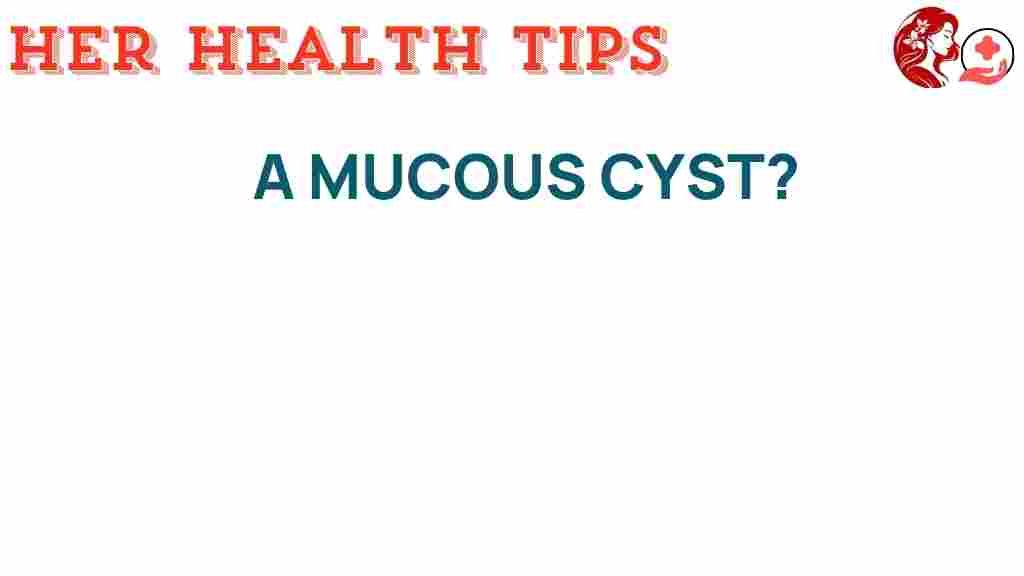Unraveling the Mystery of Mucous Cysts: What You Need to Know
Mucous cysts, also known as mucocele, are common oral lesions that can appear on the lips, gums, and inside the mouth. These cysts are often harmless, but they can cause discomfort and may indicate underlying oral health issues. In this article, we will delve into the causes, symptoms, diagnosis, treatment, and prevention of mucous cysts. Understanding these aspects is essential for maintaining good oral health and addressing any concerns you may have.
What is a Mucous Cyst?
A mucous cyst is a fluid-filled sac that forms in the oral cavity. It typically arises when the salivary glands become blocked, leading to the accumulation of mucus. Mucous cysts are generally painless but can sometimes become inflamed or infected, causing discomfort. They can vary in size and are often translucent or bluish in color.
Causes of Mucous Cysts
Mucous cysts can develop due to various factors, including:
- Trauma: Injury to the mouth, such as biting the lip or cheek, can lead to the formation of a mucous cyst.
- Salivary gland blockage: Obstruction of the salivary gland ducts can prevent mucus from draining properly, causing cyst formation.
- Chronic irritation: Ongoing irritation from dental appliances or habits like lip biting can contribute to mucous cysts.
- Infections: Certain infections can lead to inflammation and blockage of the salivary glands.
Symptoms of Mucous Cysts
Mucous cysts exhibit several symptoms, but they can vary from person to person. Common symptoms include:
- Swelling: A noticeable bump or swelling in the affected area.
- Color change: The cyst may appear bluish or translucent.
- Pain or discomfort: While many cysts are painless, some may cause discomfort or tenderness.
- Difficulty eating or speaking: Depending on the location, cysts can interfere with oral functions.
Diagnosis of Mucous Cysts
Diagnosing a mucous cyst typically involves a physical examination by a dentist or healthcare professional. They may ask about your medical history and any symptoms you’re experiencing. In some cases, imaging tests such as X-rays or ultrasounds may be needed to rule out other conditions.
Treatment Options for Mucous Cysts
Most mucous cysts do not require treatment and often resolve on their own. However, if a cyst is painful, recurrent, or interfering with daily activities, treatment options include:
- Observation: In many cases, no action is necessary if the cyst is not causing discomfort.
- Drainage: A dentist can drain the cyst to relieve discomfort and prevent further blockage.
- Surgical removal: If cysts are persistent or problematic, surgical excision may be recommended.
Prevention of Mucous Cysts
While not all mucous cysts can be prevented, there are several steps you can take to reduce the risk:
- Practice good oral hygiene: Regular brushing and flossing can help maintain oral health and reduce the risk of infections.
- Avoid habits that irritate the mouth: Steering clear of lip biting or using tobacco products can minimize trauma to the oral tissues.
- Regular dental check-ups: Routine visits to your dentist can help identify and address oral health issues before they escalate.
Maintaining Good Oral Health
Taking care of your oral health is crucial in preventing mucous cysts and other oral lesions. Here are some tips:
- Brush your teeth twice a day: Use fluoride toothpaste and a soft-bristled toothbrush.
- Floss daily: Flossing helps remove food particles and plaque between teeth.
- Limit sugary foods and beverages: A diet high in sugar can contribute to dental problems.
- Stay hydrated: Drinking plenty of water promotes healthy saliva production.
- Avoid tobacco: Smoking and other tobacco products can irritate the mouth and lead to various oral health issues.
Troubleshooting Tips for Mucous Cysts
If you notice a mucous cyst, consider the following troubleshooting tips:
- Monitor the cyst: Keep track of any changes in size, color, or symptoms.
- Avoid aggravating the area: Try not to touch or irritate the cyst, as this may lead to inflammation.
- Use warm saltwater rinses: Rinsing with warm saltwater can help soothe discomfort and promote healing.
- Consult a dentist: If the cyst does not improve or worsens, seek professional advice.
When to Seek Professional Help
While most mucous cysts are harmless, you should consult a dentist if you experience:
- Persistent pain or discomfort
- Rapid growth of the cyst
- Signs of infection, such as fever or pus
- Difficulty eating or speaking due to the cyst
Conclusion
Mucous cysts are common oral lesions that can occur due to various causes, such as trauma, blockage of salivary glands, and chronic irritation. Most cases do not require treatment, but understanding the symptoms and knowing when to seek help is crucial for maintaining good oral health. By practicing proper dental care, you can reduce the risk of developing mucous cysts and other oral lesions.
If you have any concerns about your oral health or suspect you may have a mucous cyst, don’t hesitate to schedule an appointment with your dentist for a comprehensive evaluation and tailored treatment options. For more information on oral health, you can visit the American Dental Association.
This article is in the category Conditions and created by HerHealthTips Team
